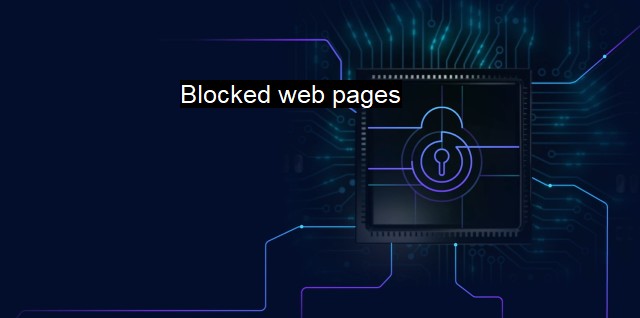What are Blocked web pages?
Strengthening Cybersecurity: Understanding the Importance of Blocked Web Pages and their Types in Safeguarding Users from Digital Threats
Blocked web pages refer to websites inaccessible to internet users through normal browsing due to various security reasons. This blocking process is mainly powered by cybersecurity protocols, and antivirus software that helps to protect electronic devices from potential threats that could compromise the users’ online safety.Webpage blocking is predominant in the internet ecosystem. Its primary goal is to prevent users from accessing websites that present potential risks like spreading malware, stealing confidential data, or propagating false information. These are typically cyber threats that have the potential to destabilize or damage computers and networks.
Cybersecurity comes into play to safeguard sensitive information and guarantee the sanctity of internet spaces. It revolves around preserving confidentiality, ensuring data integrity, and maintaining availability. All these revolve around principles intended to protect systems and data from threats that infringing on the users’ online rights to privacy and security.
Blocking of web pages primarily occur due to cybersecurity reasons. When a user tries to visit a blocked web page, they receive an error message or simply a blank page. These messages can vary depending on the nature of the block - that may be local such as from the network administrator, or the block can come from a wider source such as a national government.
Antivirus software can also lead to webpage blocking as they often come with real-time protection features that scan and prevent access to risky websites. Many antivirus programs will automatically block access to websites considered to be risky, infected, or malicious.
Third-party tools or router settings could enable webpage blocking as well. Often, these blocks cater to specific needs such as parental controls or company regulations which prevent the access of certain websites that host inappropriate content, or social media platforms respectively.
There is also the aspect of countrywide censorship – whole countries or regions may block or filter certain websites. This is usually in response to political, cultural or legal reasons. The aim of this block is to prevent access to information the governing bodies consider unsavory, unreliable, or harmful, juxtaposed against the tenets shaping that society.
Blocked web pages are a crucial aspect of online management. It might be seen to be limiting access rights of specific internet users, but in the larger context it plays an important role in managing the safety and security of the users and the sanctity of their data. Sometimes, websites are blocked wrongful under false pretenses which raises concerns about issues like censorship.
Generally, website blocking technology can help protect against harmful downloads, prevent access to unregulated gambling sites, block explicit or adult material, stop access to fraudulent websites, and enforce copyrights. Blocking of web pages at times happens behind the scenes as in the case of unsafe downloads where these security applications prevent the harmful files from reach the system.
Having software that scans websites in real-time is incredibly important, especially with the ever-growing threat of cybercrime. That’s why blocking web pages becomes a necessary evil as part of today’s world, where reliance on the internet comes with its fair share of security threats.
In short, blocked web pages play a vital and dynamic role in the field of cybersecurity. It enables the integrity and safety of digital spaces, while protecting data and personal information from potential cyber-attacks. In this sense, blocked web pages are one of many cybersecurity tools applied to maintain the security and privacy of internet users against global cyber threats. cybersecurity measures ignore the essence of webpage blocking at their peril considering the massive role it plays in mitigating cyber threats.

Blocked web pages FAQs
What does it mean if a web page is blocked by my antivirus software?
If your antivirus software has blocked a web page, it means that the software has detected something suspicious or potentially dangerous on the web page. This can include malware, phishing scams, or other types of cybersecurity threats.Is it safe to visit a blocked web page?
No, it is not safe to visit a web page that has been blocked by your antivirus software. The block is likely in place for a reason, and visiting the page could put your computer or personal data at risk.How can I unblock a web page that has been blocked by my antivirus software?
The best way to unblock a web page that has been blocked by your antivirus software is to consult the software's user guide or support resources. These resources will provide information on how to adjust your antivirus settings to allow access to the blocked page while still maintaining your computer's security.What should I do if I suspect a web page is blocked incorrectly by my antivirus software?
If you suspect that a web page has been blocked incorrectly by your antivirus software, you can contact the software's support team or submit a false positive report. These resources will provide information on how to report the false block, so that the software can be improved to better distinguish between legitimate and potentially harmful content.| | A | | | B | | | C | | | D | | | E | | | F | | | G | | | H | | | I | | | J | | | K | | | L | | | M | |
| | N | | | O | | | P | | | Q | | | R | | | S | | | T | | | U | | | V | | | W | | | X | | | Y | | | Z | |
| | 1 | | | 2 | | | 3 | | | 4 | | | 7 | | | 8 | | |||||||